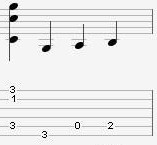
Oh, go ahead and try it.
Chapter 6
THE KEY OF C
Railroad Bill is a great song which has suffered by being performed badly. Let's work it up to where it's at least mediocre!
The piece begins with a bass run--a short and simple flock of bass notes. The first measure of the C chord is really our old Fingerpicking Pattern #2 (see "Getting Started"). Then the same bass run re-appears in Measure 3.

Oh, go ahead and try it.
http://www.andypolon.com/index.html
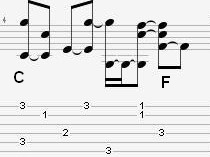
MEASURE 4: a half F chord is played on the fourth beat only. Then go
right back to the C chord.
This half F is the "baby" three-fingered version of the Full F, (its
bigger and badder cousin).
MEASURE 6: Now the E chord! Start out as in Pattern #1.
BUT Left INDEX then has to play the 1st String, First Fret at the
end of this measure. So lift index off the 3rd string--where it
should already be (!).
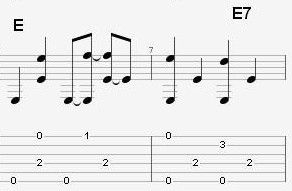
MEASURE 7: back to the normal E, adding your pinky to the E7 position (second string, third fret):
MEASURE 8: The Full F. Heavy pathos here. Ready?
You have two choices (three if you chicken out about
now):
1) Barre ALL SIX strings on the 1st fret and use your left middle and ring on the 3rd and 4th strings, respectively. Not particularly recommended, but acceptable. 2) Play the same "baby" half F above (measure 4), but ADD your Left Thumb, coming around from the BACK of the neck to just barely stop the fat 6th string at the first fret itself:
MEASURE 8 and 9:
 In Measure 9, try to add the 2nd string "d" note on and off, as
written, with your Left Pinky.
In Measure 9, try to add the 2nd string "d" note on and off, as
written, with your Left Pinky.
If you can't now, just play that string without your pinky for now,
it'll be easier once you work on the Full F awhile).
http://www.andypolon.com/index.html YES, THIS GETS EASIER WITH PRACTICE!
(No, you won't be permanently paralyzed)
Yes it gave me fits too when I first learned it (I was fifteen and awed by my big bearded teacher, Dave Van Ronk)!
No I don't think you should give up now and switch to synthesizer!
######################## IMPORTANT
NOTICE #######################################
If you're getting scared and thinking of putting this manual down now,
DON'T DO IT I was only kidding about the synthesizer. But as a music
professional I feel it is my duty to warn you of the dangers and
heartbreak that may lie ahead if you quit this method now--a
synthesizer is a lot more expensive, it's harder to carry it to the beach, and
anyway
you've already bought this book!
When I was your age and learning these
tunes I was lazier than you, and somehow I got to be really good. So
now why don't you try the F chord once again, and be a little
patient.
You know, our whole society--everything mankind has achieved so far--is
built on courageous denial of immediate pleasure, etc. (See Chapter 1).
It just might be that synthesizers are one more step on Modern Society's
Road to Ruin....Don't you care?
Don't you even care?
Don't you realize it's up to you and I--each one of us, to stop right now and TRY to make a
difference? If just ONE person......
##################################################################################
Where was I? Well, uh, now, try Railroad Bill--by now it won't seem half as bad as being lectured to.....
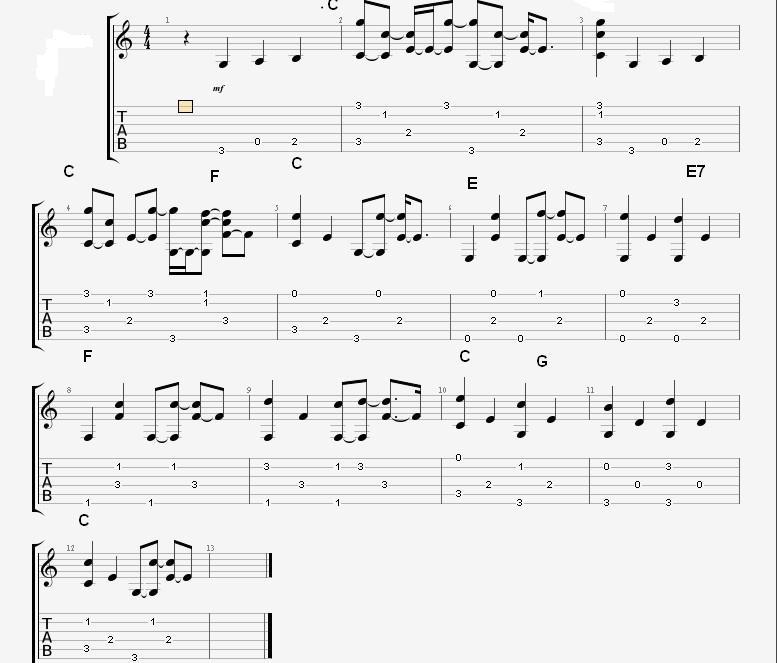
This is the CLASSIC vehicle for 1960s folkies everywhere, so throw away your half-baked old version and dig out your tie-died seat covers. It's got deliciously precise bass lines, a crisp, lightly sauteed melody....and when I finish writing this chapter I'm going out for a sandwich!
The piece is based squarely on Pattern #2 (in the Getting Started chapter), but watch those notes on the 1st and 2nd strings!
Start with your left pinky on the 1st string, third fret. By the middle of measure 1 that pinky should be OFF the first string. This is so you can play the open "e" note on beat 3.

Measure 2: The pinky now has to play the 2nd string, third fret "d"
note. Then lift it off by mid-measure, so the "b" will sound.
Measure 3: This G chord changes to a G7 in Measure 4. Make sure your Left RING
is fretting the 6th string (as the bassnote).
Measure 5: On and Off goes the pinky, starting on the third fret "g"
note. Then the Left Index plays the 1st fret in mid-measure. In
Measure 6 the pinky ends on the "d" again by mid-measure 6.
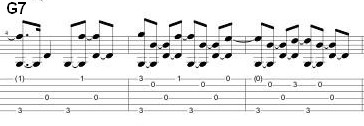
MEASURE 9: Same E chord music as Railroad Bill(whew!).
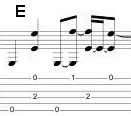
MEASURE 11
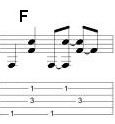 Here's that Big Bad Full F again, same as last
piece: little F with your left thumb added
('round the back door).
Here's that Big Bad Full F again, same as last
piece: little F with your left thumb added
('round the back door).
Go ahead and play it again--it's similar to Railroad Bill.
See? It's inevitable!
The last three measures are a welcome relief. If you play this chorus of Freight Train over a few times, you can stick in the opening three notes of Railroad Bill to start the repeat.
No, that doesn't mean we're not getting anywhere.
To give you some inspiration:
Think of all those great looking long-haired co-eds in the '60s, sitting on campus lawns, playing Freight Train.
This piece is practically an American tradition.
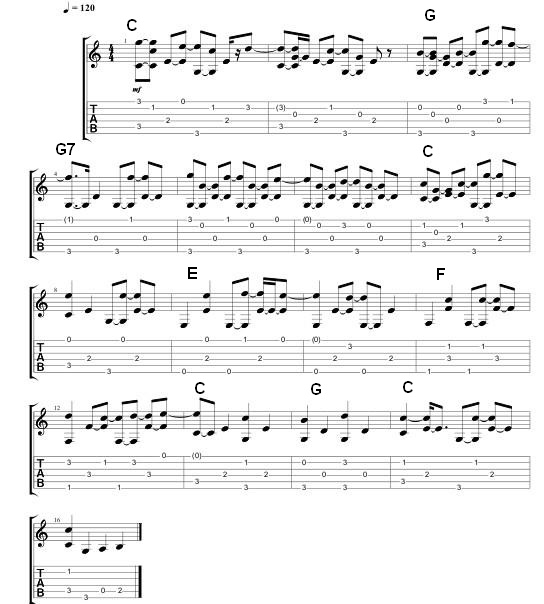
| Back to the > Play Great Fingerpicking Guitar>Table Of Contents | Trouble reading tablature?: Tablature Help Here |
More info/contact Andy: http://www.andypolon.com